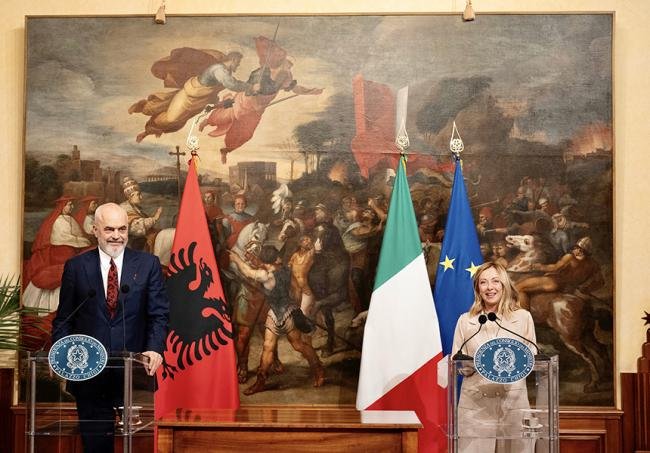The first group of 16 migrants have been relocated to newly opened asylum processing centers in Albania from Italy. This is the beginning of a plan that has received a lot of criticism due to policy of processing thousands of asylum seekers out of the Italian territory.
The 16 men, all from Bangladesh and Egypt, were picked up at sea and relocated from the Italian island of Lampedusa. They are due to disembark in the Albanian port of Shëngjin on Wednesday to be identified and screened for signs of coronavirus infection. Those who will qualify will be allowed to formally apply to be granted asylum in Italy and will be taken by bus to a processing center 20klms away from the port.
This endeavor is based on the memorandum of understanding signed on November 15, 2023 between Prime Minister of Italy Giorgia Meloni and Prime Minister of Albania Edi Rama. According to the deal, Albania will accommodate up to 3 000 male migrants while Italy processes their asylum applications. First, centers in Albania will host 400 participants, but will be ready to host 880 in several weeks.
The plan has been described by Meloni as a bold and unprecedented one that fits in the spirit of cooperation in Europe. She wants this model to be taken up with other countries that are not in the EU as well. Still, some critics and international organizations have expressed their concern about the plan for the operation, however, Meloni insists that it is an appropriate action for increasing migration in the Mediterranean.
The ban is part of the €670 million scheme, which will be financed by Italy in the next five years. The United Nations refugee agency has expressed some worries about the plan, including those of the migrants’ safety. But for the initial three months of its operations and to protect the dignity and rights of the participants, the agency shall take full responsibility of this process.
However, migrants are returned to Albania remain allowed to seek asylum in Italy under international and EU laws. As such, families, children, senior citizens and other needy groups of people such as likely torture victims will find shelter in Italy not in Albania.
Since migration still poses a major challenge to the southern European countries, Meloni’s government has endeavored to look for other European countries’ support to help address this problem. The European Commission has expressed its readiness to support Italy in this regard; only recently, Ursula von der Leyen, the head of the European Commission, was urging other countries to adopt a similar strategy for handling migration returns.



